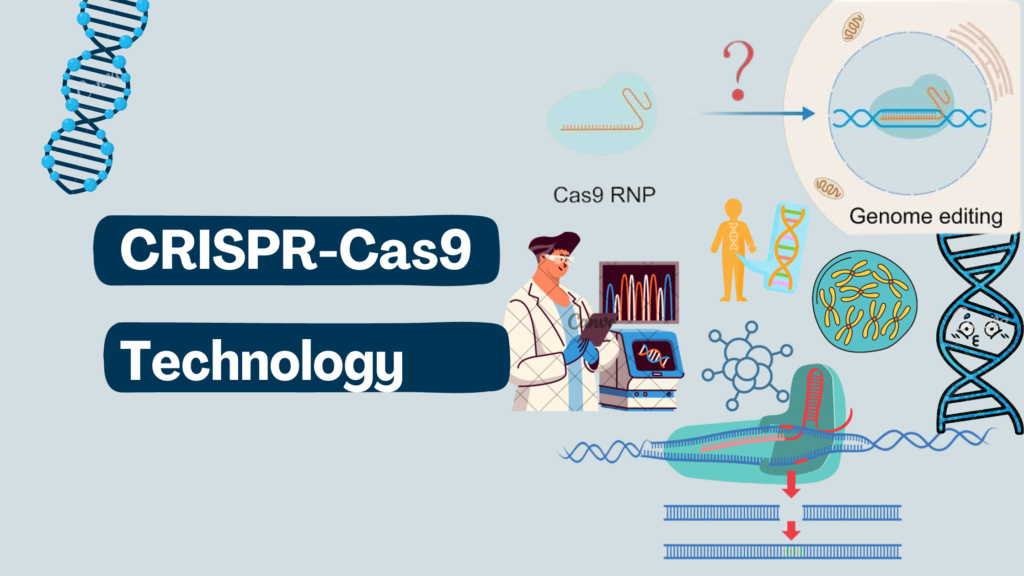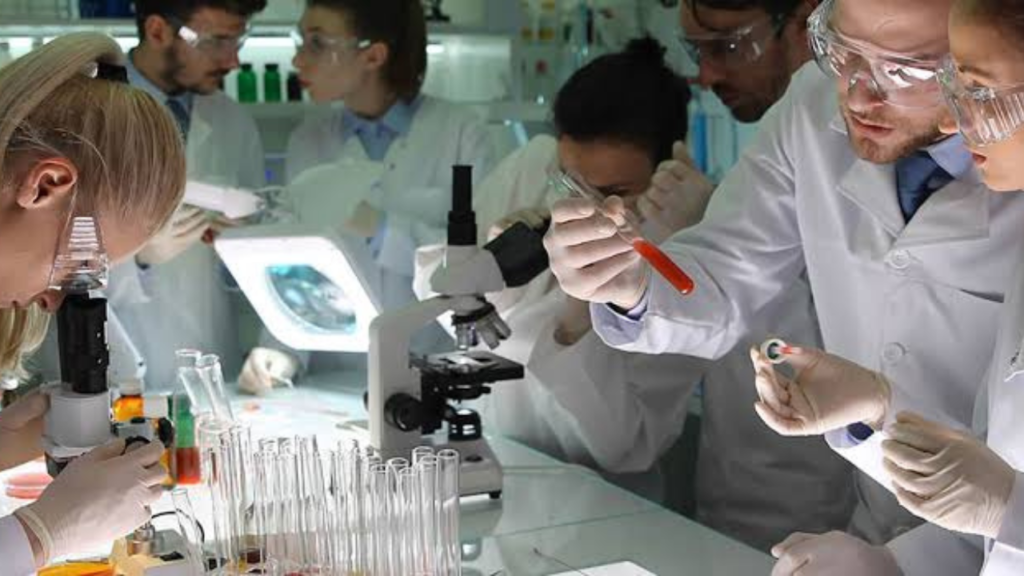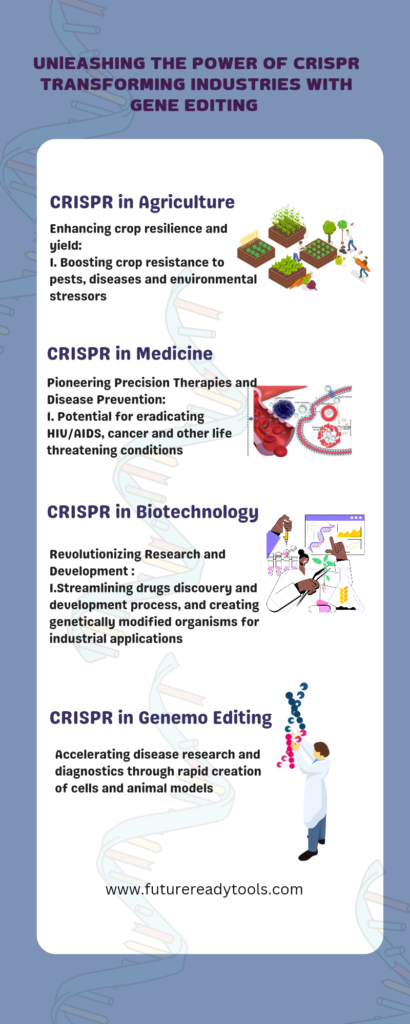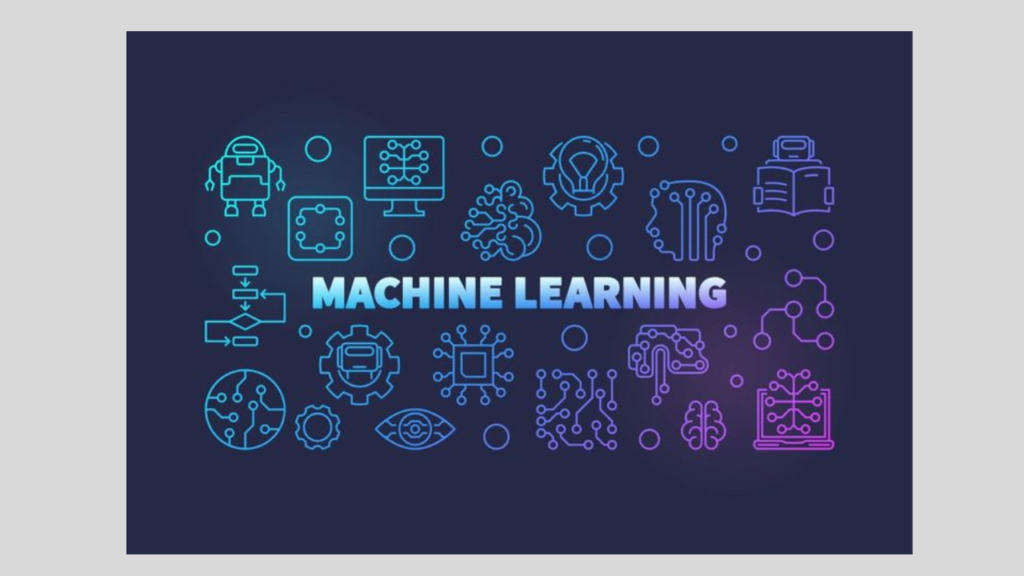Introduction
In the changing world of biotechnology, CRISPR (Clustered Interspaced Short Palindromic Repeats) has emerged as a groundbreaking tool that offers incredible possibilities for individuals interested in pursuing a career at the forefront of scientific advancements. Whether you’re an aspiring scientist or simply curious, the realm of CRISPR presents enticing opportunities that are sure to spark your imagination. This article aims to provide a guide for starting a career in CRISPR covering everything from the basics to career paths.

- Understanding the Basics of CRISPR
- Career Paths in CRISPR Technology
- 1. Research Scientist: Pioneering Genetic Advancements
- 2. Bioinformatician: Mastering Data in the Digital Era
- 3. Genetic Counsellor: Bridging Genetics and Compassion
- 4. The Journey of a Biotech Entrepreneur
- 5. Shaping Responsible Practices: The Role of an Ethics and Regulation Expert
- 6. Inspiring Future Innovators: The Impactful Journey of an Academic Professor
- 7. Advancing Medical Breakthroughs: The Vital Role of Clinical Trials Coordinators
- External Links:
- Building Your Path to a CRISPR Career: Education and Skill Development
- Education: Cultivating a Foundation of Knowledge
- Laboratory Experience: Learning Through Practice
- Bioinformatics Skills: Navigating the World of Data
- Ethical Awareness: Navigating the Complexities of Morality
- Networking: Establishing Connections, within the CRISPR Community
- Continuous Learning: Staying Up to Date in a Rapidly Evolving Field
- The Transformative Impact of CRISPR Across Diverse Fields:
- Pursue a career in CRISPR in India
- Internships and Careers in India & Abroad
- Ethical concerns related to CRISPR
- Impact of AI on CRISPR
- Conclusion
- FAQs
Understanding the Basics of CRISPR
Before embarking on a career in CRISPR, it is important to grasp the principles of this technology. CRISPR is a gene editing system inspired by the systems of bacteria and archaea. It enables scientists to accurately modify DNA, opening up possibilities in fields such as medicine, agriculture, and more.
The CRISPR Cas9 system comprises of two components:
CRISPR RNA (crRNA) and Cas9 protein.
The crRNA guides Cas9 to cut DNA sequences to facilitate gene modification. The precision and adaptability of this technology have generated enthusiasm and countless research prospects.
Career Paths in CRISPR Technology
In the field of science, there are many rewarding career options emerging that allow individuals to contribute to the ever-changing landscape of CRISPR technology. This article aims to provide insights, into roles and professions guiding you towards a fulfilling career in CRISPR.
1. Research Scientist: Pioneering Genetic Advancements
As a research scientist, you will have a role in the laboratory conducting groundbreaking experiments that advance our knowledge of CRISPR applications.
A strong foundation in biology, genetics, and bioinformatics is essential for success in this position. By contributing to discoveries, you can be at the forefront of genetic innovation.

2. Bioinformatician: Mastering Data in the Digital Era
Bioinformaticians are heroes in CRISPR research. They analyse datasets generated by CRISPR experiments, developing algorithms and software tools to accurately interpret information. By combining expertise in computer science and biology you become the data wizard behind the scenes who turns data into insights.
3. Genetic Counsellor: Bridging Genetics and Compassion
Genetic counsellors help individuals and families navigate the complex world of genetic disorders and potential CRISPR-based treatments. To embark on this path, a master’s degree in genetic counselling is crucial. By providing guidance and emotional support, you can make a profound impact on people’s lives.
4. The Journey of a Biotech Entrepreneur
For individuals with a mindset embarking on the journey of establishing your biotech company can be an exhilarating pursuit. Succeeding in the landscape of CRISPR-based ventures demands a combination of spirit, business acumen, and technological expertise. Prepare yourself to transform your concepts into realities.
5. Shaping Responsible Practices: The Role of an Ethics and Regulation Expert
The regulatory aspects surrounding CRISPR technology are intricate and constantly evolving. Professionals specializing in this field work diligently to ensure the utilization of this tool while adhering to ethical guidelines. Your involvement is paramount in navigating through the regulatory implications related to engineering.
6. Inspiring Future Innovators: The Impactful Journey of an Academic Professor
If your passion lies in sharing knowledge and mentoring the generation of scientists pursuing a career as a professor may be ideal for you. This path requires obtaining a Ph.D. Furthermore, equipped with a CRISPR degree, you can make a significant contribution in the field of teaching and research. By educating and inspiring aspiring scientists, you can effectively bridge theory and practice.
7. Advancing Medical Breakthroughs: The Vital Role of Clinical Trials Coordinators
In the realm of medicine, clinical trials are the cornerstone of testing CRISPR-based therapies. Clinical trial coordinators are responsible for ensuring these trials run smoothly and safely, bringing potential treatments one step closer to reality. This role offers a chance to make a tangible impact on healthcare and patient well-being.
In summary, the CRISPR field offers career paths each with its unique responsibilities and possibilities. Whether you see yourself as a trailblazing scientist, a data-focused bioinformatician, a compassionate genetic counsellor, or a business-savvy biotech entrepreneur there’s a place for you in the realm of science. By pursuing your passion and expertise you can play a role, in shaping the future of genetic engineering.
External Links:
https://crisprmedicinenews.com/joblistings/.
https://www.genome.gov/about-genomics/fact-sheets/CRISPR
https://www.nature.com/articles/nrg.2017.60
Building Your Path to a CRISPR Career: Education and Skill Development
Embarking on a career, in CRISPR technology requires an educational background and specific skills. Let’s explore the factors that will set you on the path.
Education: Cultivating a Foundation of Knowledge
Start your journey by obtaining a bachelor’s degree in fields like biology, genetics, biochemistry, or related disciplines. This solid educational foundation will serve as the basis for your endeavours in CRISPR. To deepen your understanding and specialization you may consider pursuing a master’s or Ph.D. Degree where you can delve into the details of CRISPR technology. Many universities now offer courses that provide the insights and techniques in this rapidly evolving field.
Laboratory Experience: Learning Through Practice
CRISPR is deeply rooted in laboratory work making hands-on experience indispensable. Look for internships or research positions in biology and genetics laboratories. These opportunities will immerse you in aspects of CRISPR techniques offering exposure to real-world applications of genetic engineering.
Bioinformatics Skills: Navigating the World of Data
Since CRISPR research generates amounts of data having proficiency, bioinformatics is becoming increasingly important. Familiarize yourself with bioinformatics tools and data analysis techniques to effectively navigate this information landscape.
This skill enables you to interpret the abundance of information generated throughout CRISPR experiments transforming data into insights.
Ethical Awareness: Navigating the Complexities of Morality
Given the considerations surrounding CRISPR technology, it is crucial to cultivate an understanding of bioethics particularly if you aspire to pursue roles related to clinical applications. A solid ethical foundation will empower you to navigate thoughtfully through the intricacies of genetic engineering.
Networking: Establishing Connections, within the CRISPR Community
In the realm of CRISPR, building connections holds value. Attend conferences, workshops, and seminars dedicated to CRISPR in order to forge a network within this field. Networking can open doors for research collaborations and job prospects connecting you with professionals who share your enthusiasm for science.
Continuous Learning: Staying Up to Date in a Rapidly Evolving Field
CRISPR technology progresses making it essential to stay current. Keep yourself informed by perusing scientific journals engaging in online courses and participating in webinars that showcase the latest advancements, in CRISPR. By committing yourself to learning you will remain at the forefront of this field.
In summary, to set yourself up for success, in the changing field of engineering it is crucial to carefully plan your educational journey acquire practical experience refine your bioinformatics skills have a solid grasp of ethical considerations establish a professional network and remain dedicated to continuous learning. Your venture into the realm of engineering starts with an educational background and a strong commitment to developing your abilities, in CRISPR technology.
The Transformative Impact of CRISPR Across Diverse Fields:

The CRISPR technology is on the verge of bringing about a transformation across sectors ushering in a new era of innovation and progress. Let’s delve into the impact that CRISPR is having in fields.
Medicine: Personalized Healing Tailored to Genetics
In the field of medicine, CRISPR technology is truly revolutionary. It paves the way for medicine, where treatments can be precisely customized based on an individual’s makeup. This breakthrough opens up possibilities for therapies in combating diseases, cancer, and a range of other medical conditions. What was once considered unattainable in terms of treatment options has now become achievable thanks to CRISPR.
Agriculture: Boosting Crop Development to New Heights
CRISPR’s impact on agriculture is equally transformative. It empowers scientists to develop crops with increased yields, improved profiles, and enhanced resistance against pests and diseases. The outcome goes beyond resilient agriculture; it also holds potential solutions for global food security challenges. As a result, CRISPR sets the stage for a friendly and productive future in farming.
Biotechnology: Fuelling Breakthroughs in Drug Discovery and Development
The biotechnology industry owes a deal to CRISPR. This groundbreaking technology has become essential for drug discovery and development processes. Through its precision gene editing capabilities biotech professionals can explore the intricacies of biology like never before. The possibilities are vast when it comes to unravelling mysteries, with the help of CRISPR. This in turn speeds up the progress of therapies and medications making the biotech industry a thriving center for innovation.
Environmental Conservation: Addressing Ecological Challenges
CRISPR also shows potential in the field of conservation. It enables scientists to modify organisms making them more resistant to challenging conditions or even eliminating species that harm ecosystems. By utilizing CRISPR capabilities researchers are contributing to the preservation of ecosystems and fighting against the impacts of climate change and invasive species.
CRISPR technology is transforming fields such as medicine, agriculture, biotechnology, and environmental conservation. With its precision and adaptability CRISPR is set to continue making contributions that benefit humanity, the environment, and future generations. As CRISPR research and applications advance further its potential impact, across these areas remains limitless.
Pursue a career in CRISPR in India
To pursue a career, in CRISPR research in India it is essential to have a foundation in areas such as biology, genetics, biochemistry, and bioinformatics. Here are some recommended steps to consider:
Obtain a bachelor’s degree from an institution in fields like biotechnology, life sciences, microbiology, or related disciplines.
Further your education by pursuing a master’s degree or Ph.D. with a focus on CRISPR-related topics from a university or research institute. Some institutions offer courses and research opportunities in CRISPR in India.
- Indian Institute of Science (IISc) located in Bangalore
- National Centre for Biological Sciences (NCBS) situated in Bangalore
- Tata Institute of Fundamental Research (TIFR) based in Mumbai
- Centre for Cellular and Molecular Biology (CCMB) located in Hyderabad
- Institute of Genomics and Integrative Biology (IGIB) situated in Delhi
- National Institute of Plant Genome Research (NIPGR) based in Delhi
- The International Centre for Genetic Engineering and Biotechnology (ICGEB) located in Delhi
Internships and Careers in India & Abroad
There are several opportunities for students who want to gain research experience in CRISPR and related fields. Here are some of the web search results that I found for you:
- NGSF Internship Program 2023: This initiative provides financial backing for internships within the field of life sciences, catering to both undergraduate and postgraduate students. Interns will have the chance to delve into independent research projects, working closely with accomplished principal investigators at renowned institutions in India. The program is open to applications for internships, granting candidates the flexibility to opt for either remote internships in computational biology or on-site placements.
- Careers | CRISPR: Official CRISPR Therapeutics website, a pioneering force in the advancement of gene-based therapeutics through cutting-edge CRISPR/Cas9 technology. Explore a diverse range of opportunities, including internships and full-time roles, across pivotal domains like clinical development, quality assurance, finance, research innovation, and beyond. Discover and apply for the latest openings conveniently through our online platform.
- Project Internship | Bioinformatics Internship: Engage in this dynamic internship program, designed to provide hands-on training and immersive projects in the field of bioinformatics and computational biology. Here, you’ll gain expertise in utilizing a diverse array of software and tools, equipping you for the analysis of biological data. Dive into tasks encompassing sequence alignment, phylogenetic analysis, gene expression scrutiny, genome annotation, and more. Enjoy the flexibility to tailor your internship to your preferences, selecting the duration and mode of engagement, whether online or in person
Gain hands-on experience with CRISPR techniques by working as a research assistant, intern, or trainee, at laboratories engaged in various projects utilizing CRISPR technology. Here are some of the companies, in the field of biotechnology that work with CRISPR:
- Editas Medicine
- Intellia Therapeutics
- CRISPR Therapeutics
- Caribou Biosciences
- Horizon Discovery
- Synthego
To stay updated on the advancements and innovations in CRISPR you can read journals and attend seminars, workshops, and conferences. Additionally connecting with professionals and experts in the field of CRISPR through networking opportunities can be helpful.
If you’re interested in pursuing career opportunities or fellowships related to CRISPR there are employers both in India and abroad. Some examples include government agencies like the Department of Biotechnology (DBT) Indian Council of Medical Research (ICMR) Indian Council of Agricultural Research (ICAR).To know more about other careers, check out this website https://futurereadytools.com/category/careers/
Academic institutions such as IISc, NCBS, TIFR, CCMB, IGIB, NIPGR, and ICGEB. Furthermore, biotechnology and pharmaceutical companies like Editas Medicine, Intellia Therapeutics, CRISPR Therapeutics,
Caribou Biosciences, Horizon Discovery, and Synthego are worth considering.
Non-governmental organizations and foundations, like Welcome Trust and Bill & Melinda Gates Foundation, also offer opportunities.
Ethical concerns related to CRISPR
CRISPR is a breakthrough, in technology that allows us to make changes to the genetic code of living organisms. Its applications span biotechnology, medicine, agriculture, and research. However, it’s essential to address the concerns associated with it before implementation.
Some of the considerations surrounding CRISPR include:
- Safety: We must approach CRISPR with caution due to the potential for side effects or mosaicism that could negatively impact the health and well-being of edited organisms and their future generations. Rigorous testing should be conducted to ensure both safety and effectiveness. Additionally, we should refrain from using CRISPR for purposes until its safety and benefits for the germline are thoroughly established.
- Justice: It’s crucial to consider how CRISPR usage might create inequalities in access, affordability, and availability of this technology’s benefits. For instance, there is a possibility that certain traits or abilities could be enhanced through CRISPR leading to advantages for individuals or groups while disadvantaging others. Moreover, inappropriate use of this technology may lead to discrimination or stigmatization based on characteristics. To address these concerns adequately regulations must be implemented based on transparent principles that ensure equitable use of CRISPR.
- Identity: One aspect we need to consider is how genetic editing, through CRISPR, may impact the identity and dignity of modified organisms or their progeny.
For instance, the utilization of CRISPR could potentially impact the diversity and distinctiveness of life forms blurring the boundaries that exist between species or even generations. On another note, it is also possible for CRISPR to have an influence, on an individual’s sense of self, agency, and autonomy as those of their future generations. Considering these factors it becomes crucial for CRISPR to uphold the value and integrity of all living beings by seeking their consent and involvement whenever feasible.
CRISPR represents a promising technology with the potential to enhance both well-being and environmental conditions. However, it also presents challenges that demand meticulous examination and thoughtful discussions, among all relevant parties involved such as scientists, policymakers, ethicists, and the general public.
Impact of AI on CRISPR
CRISPR technology, a groundbreaking gene editing tool, has the potential to precisely target and modify DNA or RNA within living cells. AI or artificial intelligence plays a pivotal role in enhancing the accuracy and efficiency of CRISPR by predicting both on-target and off-target effects.
On-target effects denote the intended alterations in the gene of interest, while off-target effects encompass unintended changes in other genes that could potentially lead to adverse consequences.
Leveraging AI’s capabilities, it becomes possible to harness machine learning to scrutinize vast datasets derived from CRISPR experiments and formulate optimal guides that minimize off-target effects while maximizing on-target effects.
Furthermore, AI is poised to facilitate the discovery of novel applications for CRISPR, including the editing of RNA to regulate gene expression and combat viral infections. By synergizing AI and CRISPR, we unlock an extraordinary potential for advancing the realms of biotechnology and medicine.
Conclusion
A career, in CRISPR is more than a job, it presents an opportunity to shape the future of science and medicine. The potential applications of CRISPR are extensive and constantly evolving making it a captivating field for those who have a passion for exploration and ingenuity. To embark on this journey begin by establishing an educational foundation gaining hands-on experience and staying updated with the latest advancements in the field. Whether you choose to pursue a career as a research scientist, bioinformatician, or entrepreneur your contributions to CRISPR technology can have reaching impacts, on society, healthcare, and the environment. So take the plunge into this thrilling realm of editing. Become part of the revolutionary wave that is CRISPR!
FAQs
- What is CRISPR?
- CRISPR (Clustered Regularly Interspaced Short Palindromic Repeats) is a gene-editing technology that allows scientists to make precise changes to DNA. It works by using a protein called Cas9 to cut DNA at a specific location. Scientists can then insert or remove DNA at this location, or make other changes to the DNA sequence.
- How does CRISPR work?
CRISPR works by using a guide RNA (gRNA) to direct the Cas9 protein to a specific location in the DNA. The gRNA is a short piece of RNA that is complementary to a specific DNA sequence. When the gRNA binds to the DNA, it brings the Cas9 protein to the same location. The Cas9 protein then cuts the DNA at this location.
- What can CRISPR be used for?
CRISPR can be used for a variety of purposes, including:
- Correcting genetic mutations that cause disease
- Creating new models of disease for research
- Developing new therapies for disease
- Improving crops and livestock
- Creating new biofuels
- Is CRISPR safe?
CRISPR is a powerful tool that can have unintended consequences. For example, if the Cas9 protein cuts DNA at the wrong location, it could cause mutations that lead to disease. Scientists are working to develop methods to make CRISPR safer, but it is important to be aware of the risks before using this technology.
- What are the ethical concerns about CRISPR?
CRISPR raises a number of ethical concerns, such as:
- The potential for misuse of CRISPR to create “designer babies”
- The possibility of unintended consequences of CRISPR editing
- The impact of CRISPR on human evolution
It is important to carefully consider the ethical implications of CRISPR before using this technology.
- What is the future of CRISPR?
CRISPR is a rapidly developing technology with the potential to revolutionize medicine, agriculture, and other fields. Scientists are working to improve the safety and accuracy of CRISPR, and to develop new applications for this technology. CRISPR is likely to have a major impact on the world in the years to come.
- How does CRISPR differ from other gene-editing technologies?
CRISPR is more precise and efficient than other gene-editing technologies, such as zinc finger nucleases (ZFNs) and transcription activator-like effector nucleases (TALENs). CRISPR is also easier to use, making it more accessible to a wider range of scientists.
- What are the limitations of CRISPR?
CRISPR is not perfect. One limitation is that it can sometimes cause unintended cuts in the DNA. Another limitation is that CRISPR cannot be used to edit all types of genetic mutations.
- What are the next steps for CRISPR research?
Scientists are working to improve the safety and accuracy of CRISPR. They are also developing new applications for CRISPR, such as using it to edit the human germline.
- How can I learn more about CRISPR?
There are a number of resources available to learn more about CRISPR. The National Institutes of Health (NIH) has a website with information about CRISPR, and the Broad Institute has a CRISPR website with educational resources.




